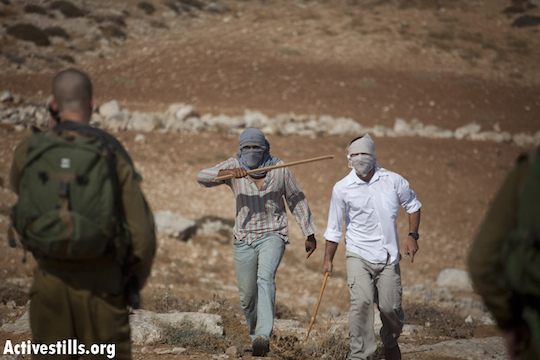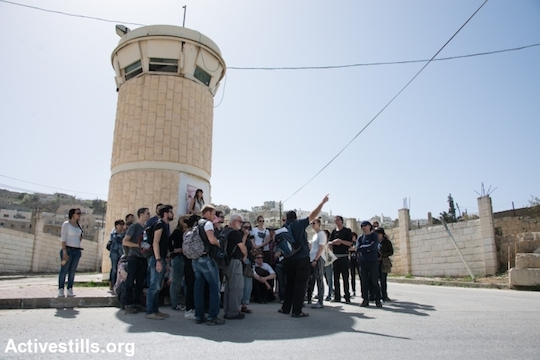On the occasion of 10 years since the founding of Breaking the Silence, a former IDF soldier talks about how he came to understand the immorality of the mission his country sent him on, and Israeli society’s silence surrounding it.
By Shay Davidovich
The drive down Highway 5, heading east into the Occupied Territories, can be deceptive. The wide road and pastoral landscape almost succeed in obscuring the barbed wire fences and heavy military presence. I know this road quite well. It leads to the settlement of Ariel, where I grew up and lived most of my life. Much of Israeli society considers Ariel to be no different than any other city, but for me and my friends there settlement ideology and sense of purpose were an inseparable part of our childhood.
I grew up knowing full well that this is home, that “Greater Israel” was not merely a mantra but a vision I would strive to bring to fruition. With such righteous belief in our cause, there was no question of whether or not to enlist as an IDF combat soldier when I turned 18 – our home must be defended. I did many things during my military service without question; yet today, in hindsight, I can’t help being doubtful about the justification for my actions.
Nothing about what I did went beyond the routine activity of the IDF in the Occupied Territories, which every combat soldier is surely familiar with. We trained inside Palestinian villages and disrupted their daily lives endlessly. We directed our firepower at areas, which to this day I cannot say were not populated by civilians with any certainty (I trusted and assumed that someone else along the chain of command with a better view of the area would call for us to hold fire if civilians were detected). Even when doubts arose occasionally, I didn’t ask questions. I remained silent and did what I was ordered to do.
One of the incidents that for me symbolizes the distorted reality we were enveloped in seemed relatively negligible at the time. Nobody really talked about it. It took place during my first time entering the territories as a soldier, four months after I was drafted. We had just completed our basic training and my company was assigned to secure the settlements in the South Hebron Hills.
This was our first combat operation. It took place just one year after the end of the Second Intifada, and our commanders leveraged that to aggrandize the complexity of the mission for days upon days beforehand. The adrenaline among us was palpable. We were on our way to a region that we knew could be hostile.
Within a few days, I found myself at a post on a hill inside the settlement of Susiya, directly opposite the Palestinian village of Susya. The countryside was beautiful and reminded me of home. But already in my first few days in the field, the belief that I was here to defend Israeli citizens against our enemy became muddled. I quickly realized that the primary source of violence and menace in the region originated not from the Palestinians but from the settlers.

I was standing at my post when suddenly I heard someone shouting: “Soldier! Soldier!” It took me a few seconds to realize that the clamor was coming from the Palestinian side. I suddenly saw a group of young settlers running down the hill toward the Palestinian village, bellowing threats and racist epithets. The situation flooded me with a deep sense of shame that only intensified as the days went on. I had never before seen the sort of violence the settlers unleashed against their Palestinian neighbors during the short time I was posted in Susyia. But even during those moments, the Palestinians remained “the enemy” and our mission to defend the Israeli settlers was unchanged.
Looking back, I am able to see the distorted nature of things that appeared quite trivial at the time. For example, the fact that I was sent not only to defend the violent settlers but also to obediently do their bidding. On my very first shift, the settler security officer (SSO) – a civilian settler appointed to the settlement’s security detail – barked at me to join him on a chase. In practice, my team and I considered our SSO to be our commander on the ground, so I did as he commanded.
I found myself running around the hills with him, gun drawn, excited, waiting for the run-in with the terrorist threatening to infiltrate the settlement. After running for a while, certain that at any moment a firefight with terrorists would ensue, our “target” came into view. We were chasing a little boy, perhaps five years old, completely naked, and running away from us in a frantic panic. After we chased the boy away, the SSO explained to me that the he had been on the grounds of the settlement – forbidden to all Arabs. Somehow, this was ample reason for the two of us to chase this five-year-old child, loaded guns at the ready. I returned to my post and continued my guard shift.
This was far from my harshest experience in the Occupied Territories, but I consider it a significant moment in realizing how twisted my grasp of reality was at that time. This distortion has become so deeply rooted in our society, that we – myself included – tend to immediately turn our backs on depictions of the world that undermine our understanding of it. My parents, veteran Likud supporters whom I had always considered to be open-minded people, were quite skeptical about the stories I passed on about my experience in the army. Even as I was speaking, and raising questions about the morality and necessity of what my friends and I had done, I ended up telling myself that there must be a larger explanation justifying all this.
Two years ago I came across an invitation for a tour to the South Hebron Hills with an organization called Breaking the Silence. A portion of the tour entailed visiting the Palestinian village of Susya. I felt compelled to go back there, see what had changed, and in particular to hear the residents’ perspective about what was happening around them. I met the very same “Arab-terrorists” I had defended the settlement against and couldn’t help feeling ashamed. After hearing dozens of testimonies by other combat soldiers who served all over the territories, I understood for the first time that this distorted reality was much larger in scope than I had originally realized. The looks of surprise on the faces of the other Israelis on the tour made it clear to me that other soldiers’ parents were at least as skeptical as my own. They had no idea what their sons and daughters were doing.

We have been exerting our military control over the Palestinians for 47 years now yet we have not stopped for a second to ask ourselves what that control actually looks like – what IDF soldiers are sent to do in our name and what moral price we pay for their actions.
For me, this is not a matter of being right wing or left wing, of whether or not to give back the territories. As far as I am concerned, imposing a military regime upon another people is immoral. Period. Most of all, however, it makes no sense to me that we – a society that I wholeheartedly believe aspires toward justice and equality – do not hold an honest discussion about what the reality in the Occupied Territories actually looks like and how to bring its oppression to an end.
I joined Breaking the Silence out of my decision to accept responsibility for what I had done during my military service and as part of a demand that my society stop for a moment and hear how we, IDF soldiers, implement military rule upon a people that does not want us there. I met with hundreds of other Israelis since joining the organization and the response is nearly always the same: “we didn’t know.”
But the silence we are breaking exists outside of Israel as well. Groups that claim to support my country label every attempt to deviate from complete support of Israeli government policies to be “delegitimization” or “self-hatred.” This distorted paradigm must be broken. Standing by Israel means standing by those who are calling for an end to the occupation. Gaining knowledge seems to me to be the most radical way to ensure we do not stand by Israel blindly.
This week marks 10 years since Breaking the Silence was founded and 47 years since the beginning of the occupation. Even if you cannot physically attend our event, I implore you to find your own way to break the silence and stand by those calling for end to the occupation.
Shay Davidovich is the educational activity coordinator at Breaking the Silence. He served in the IDF’s Combat Intelligence Collection Corps from 2005 – 2008.
Related:
Public reading of soldier testimonies to be on anniversary of occupation
Why soldiers don’t ‘break the silence’ to the IDF
‘How speaking out about the occupation nearly landed me in jail’
